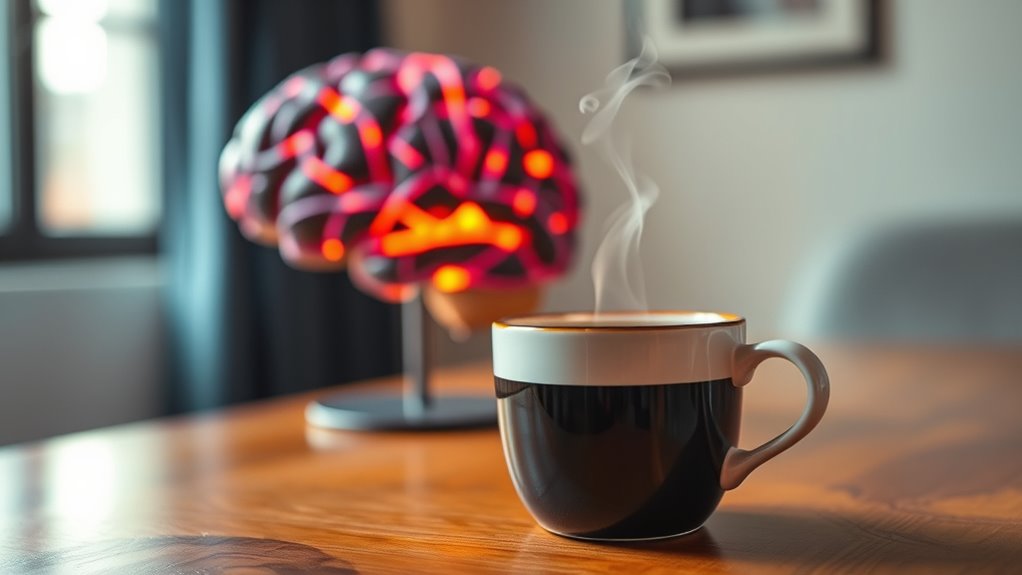Coffee supercharges your brain function by increasing alertness and enhancing cognitive abilities thanks to caffeine. It blocks adenosine receptors, boosting neurotransmitter activity. While it improves short-term memory and may lower the risk of Alzheimer’s and Parkinson’s, chronic consumption can alter brain connectivity and increase anxiety. Curiously, drinkers might experience heightened stress levels. Want to understand how it all works and what it means for your well-being? There’s plenty more to discover about coffee’s impact!
Key Takeaways
- Caffeine enhances alertness and cognitive function by antagonizing adenosine receptors and increasing neurotransmitter release.
- Chronic coffee consumption alters brain connectivity, particularly in the Thalamus and Cerebellum, affecting emotional processing.
- Regular coffee drinkers exhibit improved short-term memory and lower risks of neurodegenerative diseases like Alzheimer’s and Parkinson’s.
- Caffeine can elevate anxiety levels, especially in high consumers, impacting overall mood and emotional states.
- Moderate coffee intake provides antioxidants and reduces brain inflammation, contributing to cognitive health benefits.
The Role of Caffeine in Brain Stimulation

When you sip on your morning coffee, you’re not just savoring a warm beverage; you’re stimulating your brain in significant ways.
Caffeine acts as an antagonist to adenosine receptors, increasing central nervous system activity and enhancing alertness. This energy boost improves your cognitive function by promoting the release of neurotransmitters like dopamine and norepinephrine, positively impacting your mood and attention.
Regular coffee consumption has even been linked to increased resting brain entropy, indicating better processing abilities. You might also notice changes in functional connectivity within sensory and emotional processing networks, particularly in subcortical and limbic regions.
Effects of Chronic Coffee Consumption on Brain Connectivity

Chronic coffee consumption can lead to notable changes in brain connectivity that might surprise you. Research shows chronic coffee drinkers exhibit decreased functional connectivity in key brain areas like the Thalamus and Cerebellum compared to non-coffee drinkers. This suggests habitual coffee consumption alters brain function considerably.
Additionally, the lifetime of functional networks is longer in chronic drinkers, indicating a shift in how your brain processes information. Increased caffeine consumption is also linked to heightened anxiety and altered emotional processing, impacting your psychological states.
Network-based statistics reveal substantial differences in connectivity patterns, emphasizing the effects of coffee on brain connectivity. Ultimately, your daily cup of coffee might be reshaping your brain in ways you hadn’t considered.
Caffeine’s Impact on Memory and Cognitive Function

Caffeine greatly influences memory and cognitive function, making it a popular choice for those seeking mental sharpness. By blocking adenosine receptors, caffeine boosts alertness and enhances brain activity.
Some studies show that your short-term memory can improve with caffeine intake, while others suggest mixed results. Regular coffee drinkers may experience additional health benefits, including a markedly lower risk of Alzheimer’s and Parkinson’s diseases, highlighting caffeine’s protective effects. Additionally, hydration and nutrition play critical roles in maintaining cognitive function, further supporting the brain’s health. Research indicates that mushroom coffee can also enhance cognitive function and focus due to its adaptogenic properties. Furthermore, studies suggest that coffee’s antioxidants may combat oxidative stress, contributing to improved brain health. AI-driven education programs can also help individuals learn more effectively, enhancing overall cognitive abilities.
Increased resting brain entropy suggests that caffeine heightens processing abilities, potentially leading to better attention and learning outcomes. Additionally, dietary fiber from sources like chia seeds can further support cognitive health by promoting overall digestive wellness, which is linked to brain function.
However, the impact can vary based on individual tolerance and consumption habits, so your experience might differ from that of other coffee drinkers.
Psychological Effects of Coffee on Mood and Anxiety

Although many people enjoy coffee for its taste and stimulating effects, it also plays a significant role in shaping mood and anxiety levels.
Research shows that chronic coffee drinkers report higher stress levels compared to non-coffee drinkers. Increased caffeine consumption can heighten anxiety, particularly in males, and neuroimaging studies reveal that coffee influences emotional responses and brain function.
Caffeine acts as an antagonist of adenosine receptors, leading to central nervous system hyperexcitability that may affect your mood and anxiety levels.
The psychological effects of coffee are complex and can vary based on individual tolerance and regular consumption patterns, suggesting that your emotional state may shift with how much coffee you drink.
Understanding these effects can help you manage your coffee habits better.
Health Benefits and Risks of Regular Coffee Intake

The impact of coffee on your mental state opens the door to a broader discussion about its health benefits and risks.
Regular coffee intake can greatly enhance your brain function and cognitive function, with caffeine being linked to a 65% lower risk of Alzheimer’s and a 29% lower risk of Parkinson’s disease. Additionally, research suggests that coffee consumption is associated with improved cognitive function, making it a popular choice for many seeking mental clarity. Studies show that preventive care through lifestyle choices can also play a significant role in maintaining overall health. Incorporating low carb high protein breakfast ideas into your morning routine can further support cognitive performance. Drinking coffee can also provide antioxidants that may help reduce inflammation in the brain. Moreover, eucalyptus oil has been shown to improve respiratory function, which can indirectly support cognitive processes by enhancing oxygen flow to the brain.
Regular coffee consumption may boost cognitive function and lower the risk of Alzheimer’s and Parkinson’s disease significantly.
However, it’s vital to enjoy coffee in moderation. Excessive caffeine can lead to increased heart rate and anxiety, potentially harming your emotional well-being. The FDA suggests limiting your intake to about 400 mg daily, roughly 4-5 cups.
While coffee offers protective benefits against neurodegenerative diseases, chronic consumption can also increase stress levels, indicating that balance is important for reaping the health benefits without facing the risks.
Frequently Asked Questions
How Does Coffee Negatively Affect the Brain?
Coffee can negatively affect your brain by increasing anxiety and stress levels.
When you consume caffeine, it blocks adenosine receptors, which can lead to hyperexcitability in your central nervous system. This disruption might make you feel jittery and anxious.
Over time, regular coffee intake can create a dependence, resulting in withdrawal symptoms like fatigue and mood swings when you don’t get your usual dose. You might find it challenging to function without it.
Is Quitting Caffeine Good for Your Brain?
You might think quitting caffeine is a no-brainer, but it’s not that simple.
While stepping away can lead to withdrawal symptoms like headaches and fatigue, it could also lead to improved sleep in the long run.
If you cut back gradually, you’ll find it easier on your brain.
Just remember, everyone’s different—some might thrive without it, while others may miss the cognitive boost that caffeine provides.
Balance is key!
Can Caffeine Cause Neurological Problems?
Yes, caffeine can cause neurological problems, especially with excessive use.
You might experience dependency, withdrawal symptoms, and disruptions in neurotransmitter balance, affecting your mood and cognition.
If you’re sensitive to caffeine, higher doses could even lead to increased anxiety and stress.
Regular consumption may also impact functional connectivity in your brain’s sensory and emotional networks.
It’s essential to monitor your intake to maintain a healthy balance for your mental well-being.
Does Caffeine Affect Cognitive Ability?
Yes, caffeine does affect your cognitive ability. When you consume caffeine, it blocks adenosine receptors, which can boost your alertness and enhance your focus.
You might notice improved short-term memory and attention after a cup of coffee. However, if you drink it too frequently, it might lead to increased anxiety, potentially hindering your cognitive performance.
Conclusion
In the bustling café of your mind, coffee sparks a vibrant energy, awakening your senses like the first rays of dawn. With each sip, you’re not just indulging in a rich aroma; you’re fueling your brain’s pathways, enhancing memory, and lifting your mood. However, remember to savor it in moderation, as too much caffeine can cause jitters. So, next time you enjoy your cup, think of it as a delicious boost for your mental clarity and overall well-being.









